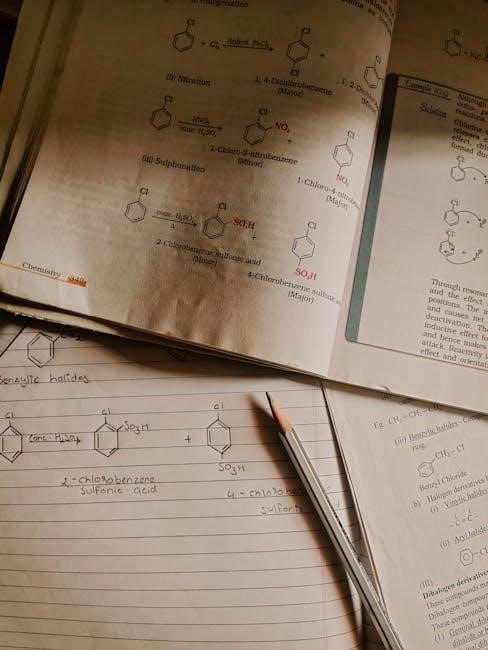The ACS Organic Chemistry Exam is a standardized test assessing undergraduate students’ understanding of fundamental organic chemistry concepts․ It includes 70 multiple-choice questions with a 110-minute time limit, covering topics like structure, reactions, and mechanisms․ The official ACS study guide provides comprehensive review materials, practice exams, and strategies to help students prepare effectively for this challenging assessment․
Overview of the Exam
The ACS Organic Chemistry Exam is a comprehensive assessment designed to evaluate students’ mastery of key organic chemistry concepts․ It consists of 70 multiple-choice questions, requiring students to apply their knowledge of structures, reaction mechanisms, and functional groups․ The exam is timed, with a 110-minute limit, emphasizing both accuracy and time management skills․ Topics covered include alkenes, alkynes, stereochemistry, and synthesis, reflecting typical undergraduate organic chemistry curricula․ The exam is standardized, ensuring consistency in evaluating students’ understanding nationwide․ Preparation materials, such as the official ACS study guide and practice exams, are widely recommended to help students familiarize themselves with the exam format and content․ This exam serves as a critical benchmark for students pursuing advanced studies or careers in chemistry-related fields․
Importance of Preparation
Preparation is crucial for success on the ACS Organic Chemistry Exam, as it evaluates a deep understanding of complex concepts like reaction mechanisms and stereochemistry․ Students must thoroughly review topics such as functional groups, synthesis, and structural analysis to perform well․ The exam’s multiple-choice format requires both knowledge and the ability to apply concepts under time pressure․ Utilizing resources like the official ACS study guide and practice exams helps students identify weaknesses and improve problem-solving skills․ Regular review of key reactions and mechanisms enhances familiarity with the material, reducing exam-day anxiety․ Consistent practice also refines time management, ensuring students can address all questions effectively․ Ultimately, dedicated preparation builds confidence and equips students to tackle the exam’s challenges successfully․

Understanding the Exam Format
The ACS Organic Chemistry Exam features a structured format with multiple-choice questions, assessing foundational knowledge and problem-solving skills in organic chemistry within a set time frame․
Number of Questions
The ACS Organic Chemistry Exam consists of 70 multiple-choice questions designed to evaluate a student’s comprehension of key organic chemistry concepts․ These questions cover a wide range of topics, including reaction mechanisms, stereochemistry, and functional group transformations․ The multiple-choice format ensures that students not only recall information but also apply their knowledge to solve problems․ The exam is structured to assess both foundational understanding and the ability to analyze complex chemical scenarios․ With 70 questions, the exam provides a comprehensive evaluation of a student’s mastery of organic chemistry principles․ This format allows for a balanced assessment of various topics, ensuring that no single area overwhelms the test-taker․ The ACS study guide is an invaluable resource for preparing for this exam, as it mirrors the actual test format and content․

Time Limit
The ACS Organic Chemistry Exam is designed to be completed within a 110-minute time frame․ This duration is carefully set to ensure students have sufficient time to address all 70 multiple-choice questions without feeling rushed․ The time limit is structured to allow for thoughtful analysis and problem-solving, reflecting the depth of knowledge required in organic chemistry; Students are encouraged to practice under timed conditions using the official study guide to build familiarity with the exam’s pacing․ Managing time effectively during the exam is crucial, as it enables students to attempt all questions and minimize errors․ The 110-minute window is a standard constraint, and proper preparation is key to optimizing performance within this timeframe․
Types of Questions
The ACS Organic Chemistry Exam primarily features multiple-choice questions designed to test a wide range of organic chemistry concepts․ These questions often focus on structure elucidation, reaction mechanisms, and stereochemistry․ Some questions require identifying the most stable structure or predicting the product of a reaction, while others assess understanding of reaction conditions and reagents․ Additionally, stereochemistry questions evaluate the ability to recognize and draw enantiomers, diastereomers, and meso compounds․ The exam also includes questions on regiochemistry, such as determining the major product of an addition reaction․ Detailed mechanisms and multi-step synthesis problems are also common, requiring students to apply their knowledge of organic principles․ Practice exams and the official study guide provide examples of these question types, helping students prepare for the exam’s challenging format․

Key Topics Covered in the Exam

The ACS Organic Chemistry Exam covers structure and bonding, functional groups, reaction mechanisms, and stereochemistry, ensuring a comprehensive understanding of organic chemistry principles․
Structure and Bonding
Understanding structure and bonding is fundamental to excelling in the ACS Organic Chemistry Exam․ This section focuses on molecular structure, bond types, and the principles governing atomic interactions․ Key topics include hybridization, VSEPR theory, and the role of orbital orientation in determining molecular geometry․ Students are expected to analyze bond polarity, electronegativity, and resonance structures, as well as differentiate between sigma and pi bonds․ These concepts form the foundation for predicting physical and chemical properties of organic compounds․ Mastery of structure and bonding is essential for understanding reaction mechanisms and functional group behavior, which are heavily tested in the exam․ The ACS study guide provides detailed explanations and practice problems to help students grasp these critical concepts effectively․
Functional Groups
Functional groups are central to understanding organic chemistry, as they determine a molecule’s reactivity and properties․ The ACS exam heavily tests knowledge of these groups, including their nomenclature, synthesis, and reactions․ Key groups such as alkanes, alkenes, alkynes, and oxygen-containing compounds (e․g․, alcohols, ethers, carbonyls) are emphasized․ Students must recognize how functional groups influence chemical behavior, such as acidity, basicity, and susceptibility to nucleophilic or electrophilic attack․ Mastery of functional group transformations and their role in reaction mechanisms is critical․ The ACS study guide provides detailed explanations and practice problems to help students identify and predict the behavior of these groups in various chemical scenarios, ensuring a solid foundation for exam success․ This section is vital for tackling synthesis and reaction mechanism questions effectively․
Reaction Mechanisms
Reaction mechanisms are a cornerstone of the ACS Organic Chemistry Exam, requiring a deep understanding of how and why reactions occur․ Students must grasp key concepts such as nucleophilicity, electrophilicity, and the role of intermediates like carbocations and carbanions․ The exam emphasizes mechanisms for common reactions, including substitution, elimination, addition, and rearrangement processes․ Mastery of mechanisms like SN1, SN2, E1, and E2 is essential, as well as understanding the influence of stereochemistry and reaction conditions․ The ACS study guide provides detailed explanations and practice problems to help students analyze and predict reaction pathways․ Proficiency in drawing and interpreting mechanisms is critical for solving synthesis and prediction questions, which are frequently tested on the exam․ This section requires active learning and thorough practice to ensure a strong command of organic chemistry fundamentals․
Stereochemistry
Stereochemistry is a critical component of the ACS Organic Chemistry Exam, focusing on the three-dimensional arrangement of atoms in molecules․ Understanding concepts like isomerism, chirality, and stereochemical outcomes is essential․ The exam tests the ability to identify and differentiate between enantiomers and diastereomers, as well as predict the stereochemistry of reaction products․ Key topics include R and S configurations, stereospecific and stereoselective reactions, and the use of Fischer and Haworth projections․ Stereochemistry often influences reaction mechanisms and product distributions, making it a high-yield area for exam questions․ The ACS study guide provides numerous practice problems and detailed explanations to help students master these concepts, ensuring they can apply their knowledge to complex reaction scenarios effectively․ Proficiency in stereochemistry is vital for success on the exam․

Recommended Study Resources
Key resources for preparing include the ACS Organic Chemistry Study Guide, offering practice tests and detailed explanations․ Utilize online platforms like Quizlet for flashcards and concept mastery․ Textbooks such as “Organic Chemistry” by Clayden or Solomons are valuable for in-depth understanding․ Additionally, practice exams and past papers provide realistic exam simulations, ensuring thorough readiness․
Official ACS Study Guides
The ACS Organic Chemistry Study Guide is a comprehensive resource designed to help students prepare for the exam․ It includes detailed explanations of key concepts, practice problems, and solutions to ensure thorough understanding․ The guide is structured to cover topics typically taught in organic chemistry courses, with a focus on reaction mechanisms, stereochemistry, and functional groups․ It also contains full-length practice exams that simulate the actual test format, allowing students to assess their readiness․ The guide emphasizes problem-solving strategies and offers insights into common pitfalls to avoid․ By aligning closely with the exam content, the official study guide provides a reliable and structured approach to mastering the material, making it an essential tool for successful preparation․ Regular use of this resource helps build confidence and improves performance in the ACS Organic Chemistry Exam․
Practice Exams
Practice exams are a crucial component of preparing for the ACS Organic Chemistry Exam, offering students a realistic simulation of the test experience․ These exams are designed to mirror the actual format, with 70 multiple-choice questions and a 110-minute time limit, allowing students to practice under timed conditions․ Many study guides, including the official ACS materials, provide full-length practice exams that cover a wide range of topics, from reaction mechanisms to stereochemistry․ They help students identify strengths and weaknesses, refine problem-solving strategies, and improve time management․ Some resources also include blank and key versions, such as those accessible via Google Drive links, enabling self-assessment and targeted review․ Regularly taking practice exams is an effective way to build confidence, familiarize oneself with the exam structure, and achieve a higher score on the actual test․ These tools are indispensable for mastering the exam content․
Textbooks
Textbooks are essential resources for preparing for the ACS Organic Chemistry Exam, providing in-depth coverage of key concepts and topics․ The official ACS study guide is a widely recommended textbook, offering 201 pages of detailed information and over 600 practice problems․ It is divided into first-term and second-term materials, making it easy to follow along with a typical undergraduate curriculum․ Additionally, textbooks like “ACS Secrets Exam Prep Book” by Matthew Bowling are popular among students, as they focus on problem-solving strategies and cover a wide range of topics relevant to the exam․ These books often include explanations of reaction mechanisms, functional groups, and stereochemistry, helping students build a strong foundation․ Textbooks complement study guides and practice exams by providing a comprehensive understanding of organic chemistry principles, making them indispensable for effective preparation․ They are a vital part of any study plan for the ACS exam․
Online Platforms
Online platforms offer a wealth of resources to help students prepare for the ACS Organic Chemistry Exam․ Websites like Quizlet provide flashcards for memorizing key terms and concepts, such as reaction mechanisms and functional groups․ Google offers tips for refining search queries to find relevant study materials efficiently․ Additionally, online forums and communities, such as Reddit or specialized chemistry groups, allow students to discuss challenges and share strategies; Many platforms also host downloadable study guides and practice exams, including PDFs, to aid in targeted preparation․ These resources are particularly useful for self-directed learning and can be accessed anytime, making them a flexible and valuable tool for exam success․ They complement traditional study materials by offering interactive and collaborative learning opportunities․

Effective Study Strategies
Creating a structured study schedule, practicing active learning techniques, and managing time efficiently are key strategies․ Regular practice exams and study groups significantly enhance preparation and understanding․
Creating a Study Schedule
Developing a structured study schedule is essential for success on the ACS Organic Chemistry Exam․ Begin by identifying key topics and allocating specific time slots for each․ Break down complex subjects like reaction mechanisms and stereochemistry into manageable chunks․ Prioritize challenging areas based on your weaknesses and past performance․ Set realistic goals for daily and weekly progress, ensuring consistent review of concepts․ Incorporate regular practice exams to simulate test conditions and assess understanding․ Adjust your schedule periodically to address gaps and reinforce strengths․ A well-organized plan helps maintain focus, reduces stress, and maximizes retention of material․ Consistency and adaptability are key to mastering the exam’s diverse content effectively․
Active Learning Techniques
Active learning techniques are crucial for effectively preparing for the ACS Organic Chemistry Exam․ Engage with the material by solving practice problems and drawing reaction mechanisms regularly․ Use flashcards to memorize key terms and concepts, such as functional groups and reaction intermediates․ Teaching the material to a study partner or explaining it aloud can deepen your understanding․ Participate in study groups to discuss challenging topics and gain diverse perspectives․ Additionally, test your knowledge by completing timed practice exams, simulating the actual exam environment․ These interactive methods enhance retention and problem-solving skills, ensuring you are well-prepared for the exam’s rigorous questions and time constraints․
Time Management During the Exam
Effective time management is essential for success on the ACS Organic Chemistry Exam․ With 70 questions and a 110-minute limit, allocate approximately 1․5 minutes per question․ Start by skimming through the entire exam to identify easier questions and tackle them first, marking harder ones for later․ This strategy ensures you secure points for questions you’re confident about․ Allocate extra time for complex questions, such as those involving reaction mechanisms or stereochemistry․ Avoid spending too long on a single question, as it can jeopardize your ability to answer others․ Practice timed mock exams to build speed and accuracy, simulating real-test conditions․ Prioritize reviewing your answers if time permits, ensuring no question is left unanswered․ By managing your time wisely, you can maximize your score and reduce exam anxiety․ Stay calm, and approach each question systematically to achieve the best results․
Approach to Different Question Types
The ACS Organic Chemistry Exam features multiple-choice questions that vary in complexity and focus․ Direct recall questions test fundamental concepts, such as functional groups or reaction mechanisms, and can be answered quickly if studied thoroughly․ Application-based questions require applying knowledge to predict outcomes, like determining reaction products or identifying structures․ Comparison questions ask students to differentiate between similar concepts, such as regiochemistry vs․ stereochemistry․ Problem-solving questions involve multi-step reasoning, often requiring analysis of reaction pathways or mechanisms․ For complex questions, eliminate incorrect options first and use process of elimination to narrow down answers․ Practice recognizing question patterns and focus on understanding underlying principles rather than memorizing reactions․ Regularly reviewing practice exams helps refine your approach to each question type, improving both speed and accuracy during the actual exam․ This strategic mindset is crucial for tackling the diverse range of questions effectively․

Common Challenges and Solutions
Students often struggle with reaction mechanisms and stereochemistry due to their complexity․ Regular practice with detailed diagrams and flashcards helps master these concepts effectively over time․
Understanding Reaction Mechanisms
Mastering reaction mechanisms is crucial for success in the ACS Organic Chemistry Exam․ Students often find it challenging to identify the sequence of steps, intermediates, and transition states․ To overcome this, using detailed diagrams and practice problems from study guides can help visualize the processes․ Flashcards and concept maps are effective tools for memorizing key mechanisms․ Additionally, analyzing reaction conditions and Arrow Pushing exercises improve understanding of how electrons move during reactions․ Regular review of common mechanisms, such as substitution, elimination, and addition reactions, ensures familiarity with the concepts frequently tested on the exam․ Combining theoretical knowledge with practical application through problem sets enhances retention and problem-solving skills․
Mastering Stereochemistry
Stereochemistry is a critical concept in organic chemistry, often challenging for students due to its complexity․ The ACS Exam frequently tests the ability to identify and differentiate stereoisomers, such as enantiomers and diastereomers․ To master this, students should focus on understanding the R/S configuration, recognizing meso compounds, and predicting stereochemical outcomes of reactions․ Practice with practice exams and flashcards can reinforce these concepts․ Additionally, visual aids like molecular models and online tools can help students better grasp spatial arrangements․ Regular review of reaction mechanisms and their stereochemical implications is essential․ By dedicating time to these exercises, students can improve their ability to identify and analyze stereoisomers effectively, ensuring strong performance on this key exam topic․
Troubleshooting Common Mistakes
Common mistakes on the ACS Organic Chemistry Exam often stem from poor time management, misreading questions, or misunderstanding key concepts․ Many students rush through questions, leading to errors in stereochemistry or reaction mechanisms․ To address this, allocate 1-2 minutes per question and double-check your answers․ Another frequent issue is misidentifying functional groups or reaction pathways, which can be mitigated by thoroughly reviewing mechanisms and practicing with flashcards․ Additionally, students often struggle with stereochemistry, so using molecular models or online tools to visualize structures can help․ Regularly reviewing practice exams and analyzing incorrect answers is crucial for identifying and correcting these mistakes․ By addressing these common pitfalls, students can improve their performance and build confidence for the exam․

Additional Resources for Support
Utilize online forums, study groups, and peer tutoring to supplement your preparation․ Interactive learning and community support can enhance understanding and address specific challenges effectively․
Study Groups
Study groups provide a collaborative learning environment where students can discuss complex organic chemistry topics, clarify doubts, and share resources․ By working together, students can engage in problem-solving sessions, review practice exams, and exchange study materials like flashcards and notes․ Study groups also foster accountability and motivation, as members encourage each other to stay on track with their preparation․ Additionally, group discussions can deepen understanding of key concepts such as reaction mechanisms and stereochemistry, which are critical for the ACS exam․ Regular meetings and active participation in study groups can significantly enhance individual performance and confidence․ This collective approach to learning is particularly beneficial for tackling challenging subjects like organic chemistry, making study groups an invaluable resource for exam success․
Peer Tutoring
Peer tutoring offers a personalized approach to learning, where students can receive one-on-one guidance from knowledgeable peers․ This method allows for focused attention on specific areas of difficulty, such as reaction mechanisms or stereochemistry․ Tutors can explain concepts in a relatable way, helping to clarify misunderstandings and strengthen problem-solving skills․ Peer tutoring also encourages active learning, as students engage in discussions and practice problems together․ Many study groups incorporate peer tutoring, creating a supportive environment where members can teach and learn from each other․ This collaborative process not only reinforces the tutor’s own understanding but also provides the tutee with tailored strategies to excel on the ACS Organic Chemistry Exam․ Regular peer tutoring sessions can significantly improve confidence and readiness for the exam, making it a valuable supplement to traditional study methods․
Online Forums and Communities
Online forums and communities provide valuable support for students preparing for the ACS Organic Chemistry Exam․ Platforms like Reddit, specialized chemistry forums, and Facebook groups offer spaces to ask questions, share resources, and discuss challenging topics․ Many students find these communities helpful for clarifying doubts about reaction mechanisms or stereochemistry․ Additionally, these forums often host experienced tutors or professors who can provide detailed explanations․ Sharing study guides, practice exams, and tips is common, creating a collaborative environment․ Online communities also allow students to connect globally, gaining diverse perspectives and strategies․ They can reduce exam anxiety by fostering a sense of camaraderie and shared goals․ Active participation in these forums can significantly enhance one’s understanding and confidence, making them a valuable resource alongside traditional study materials․

Exam Day Preparation
Ensure to arrive early, bring necessary materials, and stay calm․ A well-prepared approach on exam day enhances performance and reduces anxiety․
What to Bring
On exam day, it is crucial to arrive prepared with all necessary materials․ Bring a valid government-issued ID, your admission ticket, and required stationery like pens, pencils, and a calculator․ Ensure your calculator is approved and familiar with its functions․ Some exams may allow a clear water bottle, but avoid bringing electronics or unauthorized aids․ Organize your materials beforehand to avoid last-minute stress․ Double-check the exam center’s specific rules regarding prohibited items․ Arriving early with all essentials ensures a smooth start to your exam․ Proper preparation helps maintain focus and reduces anxiety, allowing you to perform at your best․ Remember, being organized is key to a successful exam experience․
Managing Exam Anxiety
Managing exam anxiety is crucial to perform optimally on the ACS Organic Chemistry Exam․ Effective strategies include deep breathing exercises, positive visualization, and mindfulness techniques to calm nerves․ Ensuring adequate sleep and a nutritious meal before the exam helps maintain mental clarity․ Arriving early at the venue can reduce last-minute stress, allowing time to settle before starting․ Practice relaxation methods, such as short meditation sessions, to build resilience against anxiety․ Reframe negative thoughts into positive affirmations to boost confidence․ Familiarize yourself with the exam format and timing through practice exams to reduce unfamiliarity-related stress․ Remember, preparation is key to managing anxiety, so trust your study efforts and approach the exam with a focused mindset․ By staying composed and methodical, you can tackle the challenges of the exam effectively and achieve your best performance․
Post-Exam Review
A thorough post-exam review is essential for understanding your performance and identifying areas for improvement; Start by analyzing your results to pinpoint strengths and weaknesses․ Review the questions you answered incorrectly, focusing on the concepts and topics involved․ Use the official ACS Organic Chemistry Study Guide or practice exams to revisit challenging material․ Reflect on the reasoning behind correct answers to reinforce your understanding․ If possible, wait a few days before reviewing to approach the material with a fresh perspective․ Organize your review by categorizing mistakes and creating a study plan to address gaps in knowledge․ This process not only helps in retaining information but also prepares you for future assessments․ Additionally, consider discussing your results with peers or instructors to gain insights and refine your study strategies․ Regular post-exam reviews can significantly enhance your mastery of organic chemistry concepts․ Stay consistent and proactive in your learning journey․
